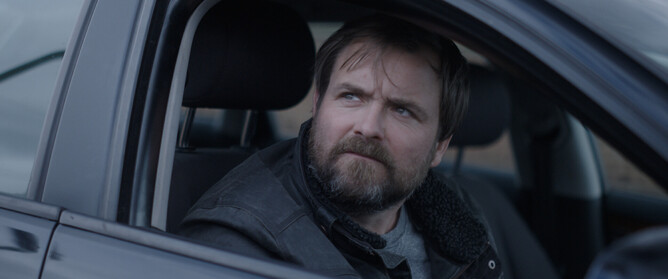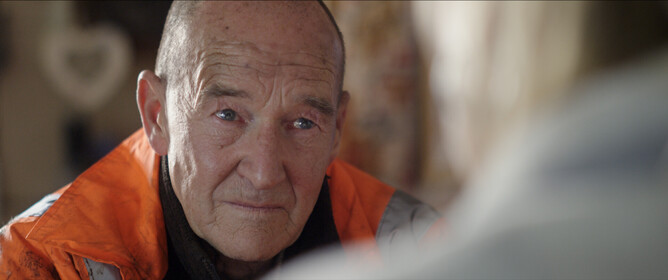BULL celebrated its UK Premiere at the BFI London Film Festival.
Fairgrounds, family, and full-on violence in Paul Andrew Williams’ defiant feature.
It’s difficult to know where to start with writing on Bull, for this is a film abundant with quality, from its director, Paul Andrew Williams, to its star, Neil Maskell and to fellow actor, David Hayman. And while we can discuss all three as significant in independent British cinema and television, let’s say Williams, Maskell and Hayman are significant players for British film and television in what each has brought both textually and representationally across both mediums. The individual vitality that encapsulates their craft finds the ideal platform in Bull with each combining to create a film fizzing with urgency, malevolence, and retributive violence.
The film follows Bull, a man with intent and on a mission to find his son that brings with it an additional bonus of avenging events that happened ten years prior. As he picks off those connected, both family and friends, with his son’s snatching and his own past, the film slowly unfolds for the audience its own and Bull’s secrets. While the plot may play out as a simple violent, revenge thriller, the film is so much more than that in its treatment of the narrative, resulting in a film so visceral and alive with fury. Bull’s journey sees him travel from fairground to housing estate; urban and rural hinterlands where families and communities exist within their own moral order. Bull himself is a contradictory and driven character; tainted by a particular capacity for violence and blessed by love for his son. Bull epitomises the knotty morality that defines the cinematic world of the film and it is Maskell’s performance that makes Bull so compelling. Bull’s violence is enacted with a controlled serenity that both unsettles and fissures. In a scene where Bull intends to unnerve a victim by taking him on a waltzer ride, a smiling Bull instructs the operator to “spin it like you’re trying to kill us”, and never has a fun fair ride been such mesmerising terror. When Bull states in the opening scenes he has “things to do my friend”; he isn’t lying.
But as the narrative progresses and flashbacks uncurl Bull’s past, it isn’t only Bull’s actions that bring tensions to the film. What comes into view is how this film is not a straight-up genre film, but one that toys at the borders of genres and plays with audience expectations. In a revenge thriller, the protagonist’s retributive actions are often accepted as justified. But as events progress, and audience awareness broadens, the usual justifications begin to be challenged here. Picking at the borders of genres obscures a sense of right, fundamental for revenge thrillers, inviting a conflicting response to events and characters. Williams has imbued the film with a subtleness which underpins the film’s structure, testing spectator perception and expectations. While Williams’ work is heavily imprinted with violence, it is his sense of place and space onscreen and the complexity of morality for characters or the necessity of making moral choices in extreme circumstances, which is proving to be a signature of Williams’s work.
Here the film, and Williams, find themselves in a contemporary lineage of explicitly blurred genre films, a recent tradition shared with Ben Wheatley and his English pastoral films, or to some extent with Edgar Wright’s Cornetto trilogy. But Williams’ own stamp is to explore nebulous morality within particular social geographies. As with Wheatley, Williams’s films – Cherry Tree Lane (2010), London to Brighton (2006), The Cottage (2008) are in settings where borders are blurred – both geographical and psychological hinterlands that exist within but live outside of social order. It is no coincidence the abiding image of Bull is that of the fairground – a transient setting that offers both romantic remembrance and malefic portent.
Against this liminal backdrop, Maskell’s performance shines as he engenders the film with a quiet, yet unflinching savagery. Take a cursory look at Neil Maskell’s CV, and you will see an actor with a prolific career across television and film, who has carved out a niche, or rather has become known for playing men with violent natures. This is largely attributable to roles in high-profile productions, such as Jay in Kill List (2011) and Arby in Utopia (2013), for which Maskell received critical acclaim for his performances. But in Bull, Maskell finally has the space and opportunity to give full throttle to a character and unleash, or rather unhinge his talent. There is much about Maskell’s face and voice which bestows him with the ability to play with credibility, a character who is both affable and caring, whilst being violently disturbing. This is no stereotypical rendering of a monster, but rather a nuanced performance that generates equally both pathos and terror and reminds us of the rhythmic essence in a working-class accent. No other actor can match Maskell in speaking threats and it’s a sign of bias present in film culture Maskell hasn’t received more critical attention for his performances. After watching Bull, think twice before you invite him round to read nursery rhymes to your children.
There are other notable performances, such as David Hayman, who plays Bull’s father-in-law and perpetrator of Bull’s betrayal ten years previous. As with Maskell, Hayman makes good use of his experience of playing rageful, but controlled men and it’s a guilty pleasure watching scenes requiring both to spar in a war of wills.
In a year that has been more than testing for the British film industry, it’s reassuring films such as Bull were greenlighted and produced. Despite the horrific violence of the film – the camera refuses to look away from the horror - there’s something restrained and measured about Bull. In the wrong hands, the performances could have been exaggerated and ‘hammy’, but understatement makes the violence that more shocking. Forming part of the film’s textual restrain is a singular melancholic tone, a sorrowness infused in Bull and the film’s setting. The richness of the film is a testament to the current talent working in British filmmaking. This is not just another revenge thriller. This is Bull. And he has things to do my friend.
Kat Flint-Nicol
Signature Entertainment presents Bull exclusively at UK Cinemas from 5th November 2021.






